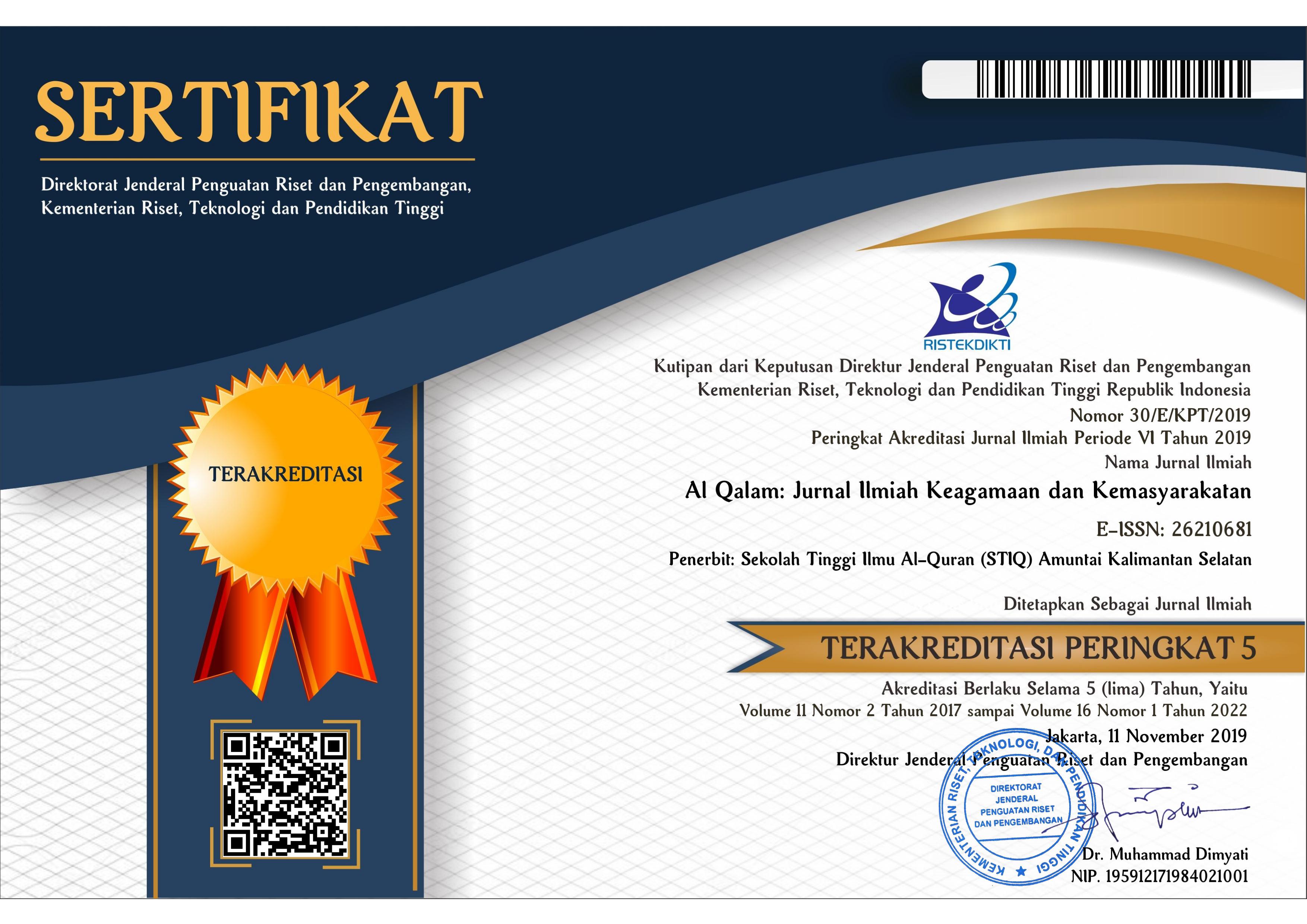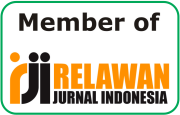Comparative Study of Al-Ghazali and Ibn Arabi's Theodicy Thoughts About Divine Love
Abstract
This research discusses the Covid-19 virus as an example of a case of suffering from the problematics of Theodicy, because Covid-19 has claimed lives, suffered economically, socially and academically, so that it appears that God is not all-just, not all-loving and not all-merciful. This research is qualitative research using descriptive analysis methods and comparative methods. This type of research is a literature review (Library Research) which uses a philosophical approach, and uses theodicy theory in the Covid-19 case. Primary data sources in this research include the works of Ibn Arabi, namely "al-Futuhat al-Makkiyah". Meanwhile, in Al-Ghazali's work, namely "Ihya Ulumuddin" part "Al-Mahabbah wa asy-Syauq wa al-Uns wa ar-Ridha". The results of this research are that Ibn Arabi and Al-Ghazali both answered that the Covid-19 suffering incident that was revealed by God to humans was not a form of wrath or punishment from God so that He is claimed to be God who is not Most Just, Not Most Merciful, and not all-loving, but as a manifestation of God, all-good, all-just, full of love and affection for His servants. However, the two have differences, namely in their path (the focal point of thought), Ibn Arabi's thinking which has a Sufistic pattern, namely on the basis of "Divine Love" with the focal point of adhering to the unity of existence (Wahdat al-Wujud). Meanwhile, in Al-Ghazali's thought, the style of his discussion is more Sufi in nature, namely on the basis of "Divine Love" with a focus on knowledge of God.
Keywords
Full Text:
PDFReferences
A. E. Affifi. The Mystical Philosophy Of Muhyid Din Ibnul Arabi. London: Cambridge University Press, 1939.
Al-Ghazali, Imam Abu Hamid. Ihya Ulumuddin. Terj. Achm. Beirut: Dar al-Fikr, 2019.
Angela, Elia, and Olivia Hadiwirawan. “Keyakinan Cinta Mengatasi Rintangan Dan Ideal: Kaitan Dengan Cinta Dan Harapan Pada Hubungan Romantis Di Dewasa Awal.” Jurnal Seurune: Jurnal Psikologi Unsyiah 5, no. 1 (2022): 1–22.
Angela, Longo. Plotinus and Epicurus: Matter, Perception, Pleasure. Cambridge: Cambridge University Press, 2016.
Arabi, Ibn. Al-Futuhat Al-Makiyyah: Risalah Tentang Ma’rifah Rahasia-Rahasia Sang Raja Dan Kerajaan-Nya. Edited by Harun Nur Rosyid. Jepara: Darul Futuhat, 2019.
———. Fushush Al-Hikam: Mutiara Dan Hikmah Keilahian Yang Terpancar Dari Cahaya-Nya, Terj. M. Sabrur Ali. Yogyakarta: DIVA Press, 2018.
Arbar, Thea. “Mengenal Covid-19 Varian Baru Omicron Yang Bikin Cemas Dunia,” 2021. https://www.cnbcindonesia.com/tech/20211127144434-37-294887/mengenal-covid-19-varian-baru-omicron-yang-bikin-cemas-dunia.
Argaheni, Niken Bayu. “Sistematik Review: Dampak Perkuliahan Daring Saat Pandemi Covid-19 Terhadap Mahasiswa Indonesia.” PLACENTUM: Jurnal Ilmiah Kesahatan Dan Aplikasinya 8, no. 2 (2020): 99–108.
Asiyah, Dewi Nur. “Pandangan Ibn Al-Arabi Mengenai Wahdat Al-Wujud Dan Konsep Kebahagiaan.” Jurnal Spiritualita: Journal of Ethics and Spirituality 2, no. 2 (2021): 73–82. https://doi.org/https://doi.org/10.30762/spiritualita.v5i2.844.
Bahtiar, Rais Agil. “Dampak Pandemi Covid-19 Terhadap Sektor Usaha Mikro, Kecil, Dan Menengah Serta Solusinya.” INFO Singkat 13, no. 10 (2021): 19–24.
Doludea, Tony. “Pandemi COVID-19 Dan Teodisi Abad 21: Sebuah Renungan Atas Yang Jahat Dan Penderitaan Manusia,” 2021. https://borobudurwriters.id/kolom/pandemi-covid-19-dan-teodisi-abad-21-sebuah-renungan-atas-yang-jahat-dan-penderitaan-manusia/.
Dzulfaroh, Ahmad Naufal. “Hari Ini Dalam Sejarah: WHO Tetapkan Covid-19 Sebagai Pandemi Global,” 2021. https://www.kompas.com/tren/read/2021/03/11/104000165/hari-ini-dalam-sejarah--who-tetapkan-covid-19-sebagai-pandemi-global?pagle=all.
Fangidae, Tony Wiyaret. “Dari Teodisi Dan Antropodisi Menuju Teo-Antropodisi: Mengasihi Allah Dan Sesama Di Tengah Pandemi Covid-19.” Veritas: Jurnal Teologi Dan Pelayanan 19, no. 2 (2020): 151–68. https://doi.org/https://10.0.142.69/veritas.v19i2.372.
Faridatullah, Bagus Nurwahyu Akhmad, Radea Yuli Ahmad Hambali, Maman Lukmanul Hakim, and Yoshy Hendra Hardiyan Syah. “Ibn Athaillah’s Theodicy Thoughts About Ugliness.” Jurnal AL-AFKAR: Journal For Islamic Studies 6, no. 3 (2023): 546–61. https://doi.org/10.31943/afkarjournal.v6i3.701.
Fuadi, Tuti Marjan dan Irdalisa. “Covid 19: Antara Angka Kematian Dan Angka Kelahiran.” JSAI: Jurnal Sosiologi Agama Indonesia 1, no. 3 (2020): 199–211.
Gunawan, Esther. “Meneropong Makna Penderitaan Manusia Menurut Konsep Teodise C.S. Lewis.” Veritas: Jurnal Teologi Dan Pelayanan 16, no. 1 (2017): 15–32. https://doi.org/https://dx.doi.org/10.36421/veritas.v16i1.8.
Hick, John. An Interpretation of Religion. New Haven and London: Yale University Press, 2004.
Hirtenstein, S. The Unlimited Mercifier: The Spiritual Life and Thought of Ibn Arabi. Oxford: Anqa Publishing, 1999.
Irham, Muhammad. “Virus Corona: UMKM Diterjang Pandemic Covid-19 Sampai Kembang Kempis,” 2020. https://www.bbc.com/indonesia/indonesia-51946817.
Isa, Syekh Abdul Qadir. Hakekat Tasawuf. Jakarta: Qisthi Press, 2011.
Izutsu, Toshihiko. Sufism and Taoism: A Comparative Study of Key Philosophical Concepts. California: University of California Press, 1984.
———. The Concept and Reality of Existence. Tokyo: The Keio Institute of Cultural and Linguistik, 1971.
Khamid, Khamid. “Wahdat Al Wujud Dan Insan Kamil Menurut Ibnu Al Arabi (Kajian Tasawuf Modern).” Jurnal Studi Al-Qur’an; Membangun Tradisi Berfikir Qur’ani 10, no. 1 (2017): 100–108.
Mustofa, M. Lutfi. “Kejahatan Dan Campur Tangan Tuhan.” Jurnal Psikologi Dan Psikologi Islam 1, no. 1 (2004): 62–68. https://doi.org/https://doi.org/10.18860/psi.v0i0.360.
Rofi’ie, Abd. Halim. Cinta Ilahi Menurut Al-Ghazali Dan Rabi’ah Al-Adawiyah. Jakarta: RajaGrafindo Persada, 1997.
Russel, Bertrand. Sejarah Filsafat Barat. Yogyakarta: Pustaka Pelajar, 2016.
S, M Nur Prabowo. “Teodisi Islam Esoteris: Pemikiran Isa Nur Al-Din Ahmad Al-Syazili Tentang Tuhan Dan Kejahatan.” Indonesian Journal of Islamic Literature and Muslim Society 3, no. 1 (2018): 1–22.
Sammel, Rochelle. Emosi: Bagaimana Mengenal, Menerima, Dan Mengarahkannya. Yogyakarta: Kanisius, 1986.
Schuon, Frithjof. Islam and the Perennial Philosophy. London: World of Islam Festival Publishing Company, 1976.
Suharso dan Ana Retnoningsih. Kamus Besar Bahasa Indonesia. Semarang: Widya Karya, 2011.
Suhrowardi, Syihabuddin Umar. Puncak Pengetahuan Ahli Makrifat. Bandung: Pustaka Hidayah, 2007.
Syafieh. “Kejahatan Dan Campur Tangan Tuhan (Sebuah Tinjauan Teodisi Dan Teologi Islam.” LENTERA: Indonesian Journal of Multidiscipnary Islamic Studies 1, no. 1 (2019): 69–84. https://doi.org/https://doi.org/10.32505/lentera.v1i1.671.
Syah, Yoshy Hendra Hardiyan. “Pemikiran Teodisi Ibn Arabi Tentang Keburukan.” JAQFI: Jurnal Aqidah Dan Filsafat Islam 7, no. 1 (2022): 61–85.
Ulfa Arieza. “Babak Belur Ekonomi Dihajar 1,5 Tahun Pandemi,” 2021. https://www.cnnindonesia.com/ekonomi/20210811220610-532-679242/babak-belur-ekonomi-dihajar-15-tahun-pandemi.
W. Suratman. “Musim Kemarau Datang, Hati-Hati Kekeringan.” In Siaga BNPB. BNPB: Badan Nasional Penanggulangan Bencana, 2019. https://siaga.bnpb.go.id/hkb/berita/musim-kemarau-datang-hati-hati-kekeringan.
Wildan, Willy. “Dampak Pandemi Covid-19 Terhadap Kehidupan Sosial Masyarakat,” 2022. https://retizen.republika.co.id/posts/24437/dampak-pandemi-covid-19-terhadap-kehidupan-sosial-masyarakat.
Zubaidi, Sujiat. “Antara Teodisi Dan Monoteisme: Memaknai Esensi Keadilan Tuhan.” TSAQAFAH: Jurnal Peradaban Islam 7, no. 2 (2011). https://doi.org/https://doi.org/10.21111/tsaqafah.v7i2.2.
DOI: http://dx.doi.org/10.35931/aq.v18i3.3350
Refbacks
- There are currently no refbacks.
Copyright (c) 2024 Yoshy Hendra Hardiyan Syah, Dadang Kuswana, Bambang Qomaruzzaman

This work is licensed under a Creative Commons Attribution 4.0 International License.
Al Qalam: Jurnal Ilmiah Keagamaan dan Kemasyarakatan
index by:
Publish by:
Sekolah Tinggi Ilmu Al-Qur'an Amuntai
Contact us:
Address: Jl. Rakha Pakapuran, Amuntai Utara
Kabupaten : Hulu Sungai Utara
Kode Pos : 71471
Provinsi : Kalimantan Selatan
Telephone : 085251613000
Email: hafizhihusinsungkar@gmail.com

This work is licensed under a Creative Commons Attribution 4.0 International License


